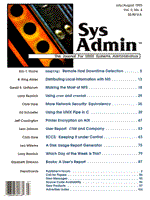
Listing 1: popen example
1 /* Listing 1
2 * popen() example
3 */
4 #include <stdio.h>
5 #define MAX_LINES 99
6 #define MAX_CHARS 4000
7 #define MAX_TXT 256
8
9 main()
10 {
11 char *slines[MAX_LINES];
12 char sbuf[MAX_CHARS];
13 char *com_str="who|sort|pr -n -t|grep -v '^[ \\t]*$'";
14 int count,i;
15
16 count=run_popen(slines, sbuf, com_str);
17 fprintf(stderr,"count is %d\n", count);
18 for(i=0; i<count; i++)
19 printf("%s\n", slines[i]);
20 }
21 /*
22 * This function executes a piped command passed as
23 * a pointer-to-string, exe_str.
24 * buffer is the array where each line is stored
25 * lineptr is an array-of-pointers where each element of the
26 * array points to the beginning of each line stored in buffer.
27 *
28 * returns the number of lines read into buffer, cnt.
29 */
30 int run_popen(lineptr, buffer, exe_str)
31 char *lineptr[]; /*array-of-pointers to addresses */
32 char buffer[]; /*buffer to save strings */
33 char *exe_str; /*pipe command */
34 {
35 int i, cnt=0;
36 FILE *ptr, *popen();
37 char *bufstart, *bufend, line[MAX_TXT], *fgets();
38
39 bufstart = buffer; /*mark start of available space*/
40 bufend = buffer + MAX_CHARS; /*mark end of available space*/
41 if((ptr = popen(exe_str, "r")) == NULL)
42 fatal("Couldn't open pipe");
43
44 for(i=0; i<MAX_LINES; i++)
45 {
46 if(fgets(line, MAX_TXT, ptr) == NULL)
47 break;
48 line[strlen(line)-1] = '\0'; /* no new-lines*/
49 if((bufstart + strlen(line) + 1) >= bufend)
50 fatal("Line too long");
51 lineptr[i]=bufstart; /*save the address of the line*/
52 strcpy(bufstart,line); /*save the line into buffer*/
53 bufstart += strlen(line)+1; /*update starting pointer*/
54 cnt++;
55 }
56 fclose(ptr);
57 return cnt;
58 }
59 /*
60 * Fatal Error
61 */
62 int fatal(x)
63 char *x;
64 {
65 perror(x);
66 exit(1);
67 }
/* End of File */
|